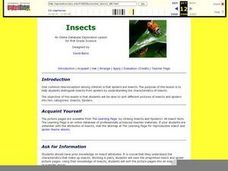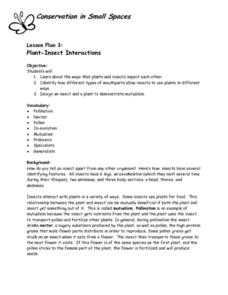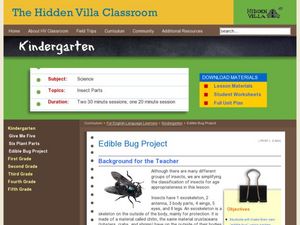Curated OER
Insect Anatomy
Break down insect anatomy with this worksheet! Class members diagram insect anatomy by drawing a line from the names of grasshopper body parts to the corresponding parts on an image of a grasshopper. The worksheet provides the word bank...
Biology Junction
World of Insects: Characteristics, Orders, and Collecting
Every bug is an insect, but not all insects are bugs. A presentation lists the characteristics of insects, describes their body parts, and explains metamorphosis. It also details every order and includes photographs and multiple facts...
Curated OER
What Is An Insect?
Students find and classify insects. They collect insects, study them with a hand lens and identify its body parts. Afterwards, they discus various types of insects and thier Orders such as beetles, butterflies and moths, grasshoppers, etc.
Curated OER
My Insect Report
Is your class writing a report on insects? If they are, you have to check out this great set of worksheets. It provides a well-scaffolded system they can use to organize their research findings in order to compose a well-structured...
Cornell University
Insect IPM
Find out the characteristics that makes a bug an insect with a workbook designed to inform scholars about the crawly creatures that live around us. Scholars complete an ant-themed word search, answer questions using a solution key, and...
Curated OER
Invent an Insect
Explore biology by researching adaptation. First, learners research and define a list of insect vocabulary terms and discuss the benefits of each insect characteristic. They then utilize a worksheet to create their own insect and share...
Curated OER
Imaginary Insect Zoo
Students create imaginary insects that contain essential characteristics of an insect, such as six legs and three body parts. In this Science/Arts lesson, students distinguish between an insect and non-insect. Students create their own...
Curated OER
Investigating Crickets and Their Body Parts
Second graders investigate the body of a cricket. In this biology activity students use tools to gain information about the insect the cricket. Students observe and identify features and describe how these features help the cricket live...
Curated OER
Insect Symmetry
Students explore symmetry in the insect world, comparing and contrasting insects and their symmetrical bodies and wings. They draw symmetrical insects, identifying body parts and explore nature's examples of symmetry. Afterward, they...
Curated OER
Science: How to Identify Insects
First graders discover how to distinguish spiders from insects by understanding the characteristics of each. They sort online picture pages into the two groups and examine the insects for common attributes. Students complete a worksheet...
Curated OER
Conservation in Small Spaces: Plant-Insect Interactions
Students explore ways that plants and insects impact each other, identify how different types of mouthparts allow insects to use plants in different ways, and design an insect and a plant to demonstrate mutualism.
Curated OER
Insects
Introduce your unit on insects with this six-slide PowerPoint presentation. Characteristics of an insect are briefly discussed, including two informative diagrams. Tip: After showing this presentation, ask students to share what they...
Curated OER
Edible Bug Project
Students recognize the characteristics of insects. In this edible bugs lesson, students observe the body parts of an insect. Students create an edible insect using a grape, carrot sticks and sorrel stems and leaves. Students share the...
Curated OER
Those Busy, Buzz'n Worker Bees
Young scholars research information on worker bees. In this insect lesson, students review the body parts of insects and how bees find flowers. They discuss compound and simple eyes and the life cycle of a worker bee.
Curated OER
Torn Insect Art
Sometimes the best way to drive home a concept is through an art project. Here is a quick and easy activity that can help learners remember or become more familiar with the parts on an insect's body. They tear brightly colored paper into...
Terminix
Amazing Insect Facts
Insects are like little aliens living all around us. Explore fun and interesting insect facts by having the class read a short informational paragraph. The paragraph focuses on how we are similar and different to insects and includes...
Curated OER
Which One is an Insect?
For this science worksheet, students categorize 18 words as either insects or not insects. Students write the words in a two-column chart under the correct category.
Curated OER
Six Plant Parts
Students create a harvest burrito out of fruit, flowers, roots, stems, and more. In this plants lesson plan, students go out into the garden and identify the 6 plant parts.
Curated OER
The Insect Files
Students are provided with a physical description of the insect, in words and graphics, including body parts, special adaptations, color, and so on. They explore and report on all four elements of an insect's habitat: food, water,...
Curated OER
The Insect World
Students investigate how insects communicate since they cannot use their mouths for producing sound like humans can. In small groups, they devise a way to make an insect-like sound using body parts other than their mouths or vocal...
Curated OER
Introduction To Insect & Spider Body Parts
Pupils inspect several different specimens of insects and spiders to determine characteristics that are similar and different between the two groups. They identify the basic body structure of spiders and insects and then predict where...
Curated OER
Body Parts of a Butterfly
Students identify the seven major parts of a butterfly. In this butterfly anatomy lesson, students explore three dimensional models of butterflies and discuss the anatomy. Students view a PowerPoint for the anatomical parts of a...
Curated OER
Bug Snack
Students create an insect out of food. In this insect characteristics lesson, students review the 3 body parts of an insect and use various foods to create a sample insect. Students learn a song about insect body parts.
Curated OER
Ants
Ants are a common example to use when conducting lessons on insects, and if your youngsters are squeamish, this is a way to introduce them without actually bringing them into the classroom! Viewers of this PowerPoint learn about the...

























